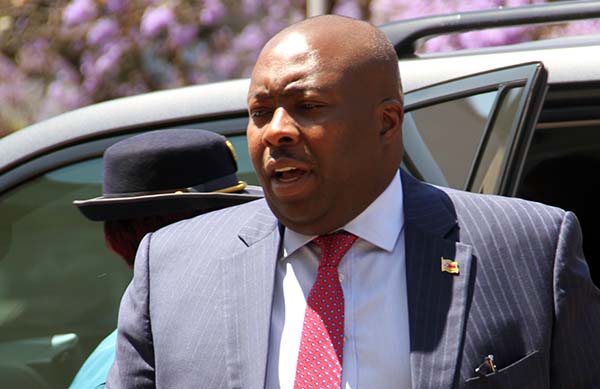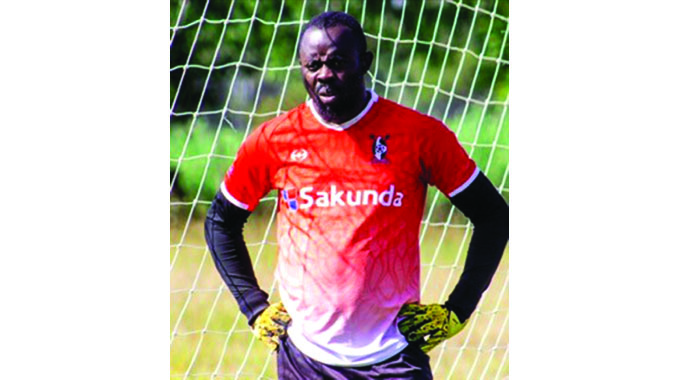YES, KHAMA, I ALSO FEEL YOUR PAIN

I WAS one of those who stayed up until the early hours of Wednesday desperate to watch it all unfold live from the comfort of my living room — a defining hour-and-a-half of football unfolding on the other side of the world, in the shadows of the Andes mountain range, on the edges of the Pacific Ocean. There are some things one simply has to sacrifice for and the comfort that sleep provides, especially after a hard and long day at the office, slipped down the pecking order of importance, replaced by a raging willingness to watch all this compelling drama live as it unfolded.
It had never happened in my lifetime — more than four decades and counting — and the last World Cup they had missed was the one held in the year I was born, way back in 1970, when our generation’s arrival duly coincided with the first broadcast of this powerful global football festival in colour on television. Along the way they had been crowned World Champions twice in 1978 and 1986 and twice they had lost in the final, in 1990 and in 2014, and in the process produced some of the finest footballers to grace the game, including two who are always mentioned when the globe discusses the greatest of all-time.
And now, they faced the ultimate humiliation of becoming the first nation to reach the final of the World Cup in the previous edition and then fail to qualify for the next edition of the tournament, in half-a-century and for me and millions others, this was a moment not to be missed as it unfolded live. The seven-hour time difference between Harare and Quito, on the other side of the world and closer to the Pacific and a cool 12 070km away — if there was a direct flight between the two capitals — counted for nothing as the lure of this drama overshadowed everything.
There are some things that simply have to be seen, when they happen and you have to go through all the motions and emotions of the drama, than wait to be told when the moment had passed: Like telling people I was part of the group — the tens of thousands inside the stadium in Quito and the millions — and if one considers the massive interest this sparked in India and China — then the billions who had the privilege of watching this compelling drama unfold live on television.
Like telling people that I was part of the generation that had not been born, when it had last happened, arriving on the scene just after it had happened, some 47 years ago, and then I was there to see it unfold live when it finally happened again. Like telling people that I saw it all as in real time, and not as a story that was being told in the past tense when it had long passed and, for the first time in my life, I went to bed knowing that the great Argentina had failed the test and, like my beloved Warriors, would also not be part of the World Cup finals.
Like telling people I saw the tears in Lionel Messi, as he cried for Argentina, on a night where the grim possibility of failure virtually represented the end of his era on the international football scene, the final chapter being written high up in the Andes mountains as if for all of us mere mortals, who live on the ground, to see it all. Like telling people that fittingly, given it had last happened in the year the world said goodbye to the Swinging Sixties and the music that emerged from that decade — from the Beatles to The Rolling Stones — on the night it happened again, even the music stopped as legendary Irish group U2 were forced to delay their Buenos Aires show by two hours.
As it turned out, we got far more than we had bargained for and when it was all over, at 3.35am Zimbabwe time on Wednesday, it had all been worth waiting for even though the outcome was certainly the very opposite of all the fears and expectations of the Argentine Armageddon.
WATCHING THE DRAMA WITH KHAMA, A THOUSAND KILOMETRES AWAY
When Messi swung the killer blow, his hat-trick goal to confirm his country’s place in Russia next year, appearing as if he was going down on his back just to find the elevation needed to give the ball just the touch to produce a spin and try and loop it over a goalkeeper, who had drifted from his line, in the closest that a footballer has possibly come to matching Michael Jordan’s fade-away Game 6 winning shot in the ’98 NBA Finals against Utah Jazz— fittingly his final game for the Bulls — time appeared to stand still.
Frozen in the beauty of the moment, trapped in the disbelief of the execution, captured in the amazement of the precision, shackled in the wonder of the possibilities — a spell having been cast around those of us who were watching, wondering and imagining — as the ball spun from the source of its launch, with enough spin to fly over the tall ‘keeper and the right power to ensure its loss of flight, for it to dip into the nets, and not go over the bar, would happen at the right time. Miguel Delaney, a football writer who writes for British online newspaper, The Independent, probably put it all in the best context.
“Divine intervention, a holy trinity of goals on a night a special saviour offered redemption and deliverance, not even Diego Maradona had to do this, in a team under-performing like this,’’ he wrote.
“This was the Hand of God in a different way, and the way he did it was even more impressive than the bold bald fact that Messi scored a hat-trick to deliver his side to the World Cup.’’ In today’s global village, where technology makes it easy to see who is also on board the same train even though they might be very far away, with the magic of Twitter providing a platform for comments to be passed along the way, it became apparent on that Wednesday morning that Warriors star Khama Billiat had also stayed up to watch this South American drama. To appreciate that there are moments in this game, especially when it comes to national duty, when the crippling shortcomings of teammates become irrelevant as a people, a nation, call on those the Lord blessed with more skills than the combined skills of what He gave to their teammates, to do it alone and carry everyone on their shoulders.
Something which the King himself, Peter Ndlovu — the greatest Warrior of all-time — used to do with repeated and productive frequency, even on the occasions when they had to bundle him into a car in England in his club’s uniform after a game to ensure he didn’t miss his long flight back home, using the airport facilities to freshen himself up and change, arriving at Harare International Airport just hours before the game and rushing straight into battle at the National Sports Stadium to produce a man-of-the-match show.
Something which Knowledge Musona, in terms of dragging the Warriors forward, has been doing with a touch of distinction in the past half-a-dozen years.
Something which Khama did, with a touch of style, in our last successful qualifying campaign for a place at the 2017 Nations Cup finals where he regularly provided the X-Factor and something which the nation expects him to keep delivering when the battles for a place at the 2019 AFCON finals resume next March with some tough battles. Of course, our two leading lights — Khama and Knowledge, our Double K Combination — cannot play like Messi, the Argentine superstar is on his level somewhere in the stars, but the fans will certainly not be asking for too much when they say they expect to see them keep influencing the Warriors matches the way the Little Maradona did as he carried his nation, and a good part of the world, on his shoulders on Wednesday morning and delivered it to the Dreamland of Russia 2008.
And, just as well, Khama watched the show from Ecuador live on Wednesday morning and, as he tweeted about the events which had unfolded before his eyes, the hope will be that he picked some priceless lessons about the value of leadership, the refusal to be buried by the burden of expectations, what defines greatness and separates it from the average and why the nation always demands so much from him because he is one of the very best that we have. That form is temporary, but class is, by its sheer definition, permanent and a bad game here and there, just like the great Messi in the matches against Venezuela and Peru where he failed to score, should never make him question his class and the fans’ trust in him, his skills and his commitment to the cause.
IT’S A PITY KHAMA BELONGS TO THE GENERATION WHOSE WORLD CUP ZIFA DESTROYED
As we watched the Messi Masterclass on Wednesday morning, I picked out that Khama had tweeted towards the end of the match and the message carried a very deep meaning.
“Yesterday’s hero was Salah, today’s hero is Messi,” his tweet said. Salah is the Mohamed Salah of Liverpool and Egypt who refused to buckle under the pressure of 100 million Egyptian hearts whose lives froze for a fleeting moment as he embarked on that short run to strike the ball from the penalty spot in Alexandria on Sunday night, deep in time added on, which sent them to the 2018 World Cup for the first time in 27 years.
A deep analysis of Khama’s short statement revealed a message pregnant with meaning about a footballer who, while saluting the deeds of others who had inspired their country to the World Cup finals, was being still being tormented by the cruelty of a scenario which saw him being denied a chance to also do the same for his country.
A man, at the very peak of his athletic powers who in January this year was voted the best in-field footballer plying his trade on the continent by CAF, struggling to deal with the emotional persecution of not getting a chance to also fight for his beloved countries in these World Cup qualifying trenches. A thoroughbred athlete, as diminutive as both Messi and Salah in built — them of that lower centre of gravity that helps them float like butterflies on the football field — still struggling to understand why he, and his fellow Warriors, had been denied a chance for a crack at such immortality.
A fine footballer who only last December was gracing the hallowed football fields of the FIFA Club World Cup, in the colours of his South African country, being devoured by the pain of having been denied the opportunity to try and take his country to the World Cup finals like Messi and Mohamed. A brilliant athlete who earns a cool $22 500 a month in basic wages at his South African club being tormented, in those early hours of the morning, about how the very people who had been chosen, and undertaken, to run the affairs of his country’s football governing body could fail, in more than five years, to raise $60 000 to pay a former coach, leading to the Warriors banishment from the World Cup qualifiers, at a time when they could engage a photographer whose bill ran to $30 000.
A fine footballer who couldn’t understand how the same leadership, which received a cool $55 000 cash donation from one of their all-weather partners, friends, Prophet Walter Magaya, for the Warriors team that went to the 2015 COSAFA Castle Cup in South Africa, could not ask for a helping hand from such a football-mad benefactor to help them pay off a $60 000 debt when the country’s World Cup dance was now at stake.
A great athlete who couldn’t understand how the then leader of his Association, who now claims he poured more than $1 million of his funds into the football governing body, as a debt to ZIFA — including about $240 000 that was used to charter an Air Zimbabwe Boeing 767 long-haul passenger jet to fly the Warriors and their fans to a 2012 AFCON qualifier against Mali in Bamako — could not realise the importance of allocating just $60 000 of that mount towards the servicing of that Valinhos debt given what was at stake in the event of failure to pay that amount.
A very patriotic footballer who could not understand why the then ZIFA leadership kept ignoring repeated warnings from FIFA, choosing to stash the correspondence in their drawers at their offices rather than raise the red flag to the authorities — including the Sports Ministry about the need to have this debt dissolved and the consequences which would come with failure to do so — only to then raise the alarm when the bombshell of expulsion came.
I have heard it a number of times, my colleagues wondering how the entire nation failed to come up with $60 000, and I have repeatedly told them that isn’t the case because the brutal reality is that the previous ZIFA leaders simply kept the whole drama to themselves, in their offices, and never at any moment raised the issue with either the Sports Commission or the Sports Ministry about the severity of the occasion.
Too bad, a golden generation, who were good enough to be the only Southern African group of footballers to qualify for the 2017 AFCON finals where they went pound-for-pound against three opponents who were part of this World Cup qualifying show — Algeria, Tunisia and Senegal — were denied a great chance to fight for a place in Russia by the shortcomings of their leaders.
Denied an opportunity to be heroes like Messi and Mohamed and more importantly, denied the chance to write the kind of success story — which unites their nation and help its people forget some of their challenges — which only a successful World Cup campaign can do. Remarkably, on Sunday night, the same Tahrir Square that had become the epicentre of a seismic Egyptian political revolution — with tens of the thousands of protesters gathering there to fight for their causes — was turned into a cathedral of grand celebrations, with military helicopters even dropping flags for the people to wave in their moment of glory as Egypt was united by the power of football.
Too bad, and that’s what hurts, our golden generation were denied such an opportunity to bring together their nation with a great World Cup success story.
To God Be The Glory
Come on Warriors!!!!!!!!!!!!!!!!!!!!
Khamaldinhooooooooooooo!
Text Feedback — 0772545199, WhatsApp Messenger — 0772545199. Email — [email protected], Skype — sharuko58
Chat with me on Facebook, follow me on Twitter @Chakariboy, interact with me on Viber or read my material in The Southern Times or on www.sportszone.co.zw. You can also interact with me on the informative ZBC weekly television football magazine programme, Game Plan, where I join the legendary Charles “CNN” Mabika and producer Craig “Master Craig’’ Katsande every Monday night at 21.15pm.








Comments